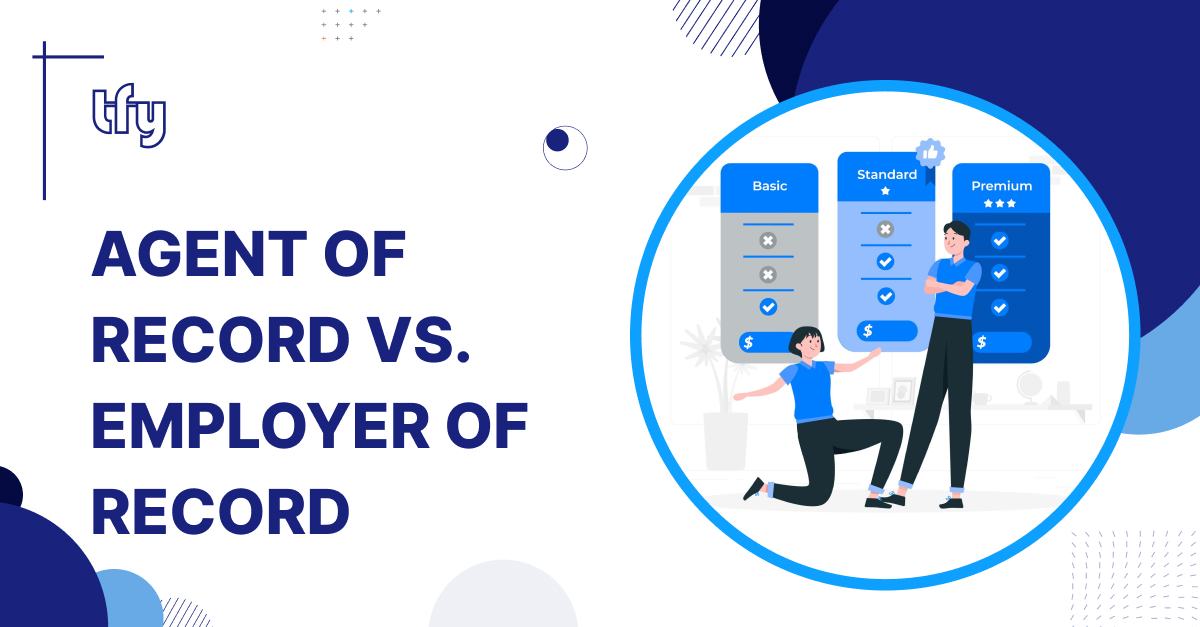
Hiring internationally is exciting—until you hit the wall of compliance headaches. Different countries, different laws, different payroll rules. It’s enough work for any HR Team.
That’s where Agent of Record (AOR) and Employer of Record (EOR) come in. Both help you hire across borders, but they serve very different needs. Picking the wrong one could lead to facing fines, legal trouble, or worse—losing great talent.
So in this article we help you break it down in simpler terms::
- What AOR and EOR actually mean
- Key differences (and why they matter)
- When to use each one
- How Transformify (TFY) makes both options easy
Feature | Agent of Record (AOR) | Employer of Record (EOR) |
Worker Type | Freelancers, contractors | Full-time employees |
Who’s the Boss? | Contractor stays independent | EOR becomes the legal employer |
Handles | Contracts, taxes, compliance | Payroll, benefits, employment laws |
Best For | Short-term projects, flexible work | Long-term hires in countries where you don’t have an entity |
What’s an Agent of Record (AOR)?
An AOR is your behind-the-scenes partner for hiring freelancers and contractors globally. It keeps everything legal so you don’t accidentally misclassify workers (a very expensive mistake).
What an AOR does for you:
✔ Worker classification – No more guessing if someone’s a contractor or employee.
✔ Compliant contracts – Localized agreements that hold up in court.
✔ Easy payments – Send money in 180+ currencies without tax headaches.
✔ Audit protection – Sleep well knowing your paperwork is bulletproof.
What’s an Employer of Record (EOR)?
An EOR is like your global HR department. It legally employs workers in countries where you don’t have a business entity, handling payroll, benefits, and local labor laws.
What an EOR does for you:
✔ Hire employees anywhere – No need to set up a local company.
✔ Payroll & taxes done right – No missed filings or penalties.
✔ Local benefits handled – Health insurance, pensions, PTO—all compliant.
✔ Terminations made easier – No legal landmines when parting ways.
AOR or EOR? How to Choose
Go with AOR if:
- You’re hiring freelancers for short-term projects.
- Workers want to stay independent (no benefits needed).
- You need to pay in local currencies without tax drama.
Go with EOR if:
- You’re hiring full-time employees abroad.
- Local laws require formal employment contracts.
- You need to offer benefits (healthcare, retirement, etc.).
How Transformify Makes Global Hiring Simple
Why juggle multiple vendors when you can manage AOR and EOR in one place?
With Transformify (TFY) AOR, you get:
- Freelancer contracts that comply with local laws.
- Automatic payments in 180+ currencies.
- Tax forms handled (W-8BEN, 1099s, etc.).
- No hidden FX fees.
With Transformify (TFY) EOR, you get:
- Full-time employees hired anywhere—no entity needed.
- Benefits, payroll, and taxes handled for you.
- Employment contracts tailored to each country.
- GDPR-compliant data security.
Transformify’s (TFY) compliance engine checks every hire to ensure you’re using the right model every time.
There’s no “one-size-fits-all” for global hiring. But with the right partner, you can scale faster—without the legal nightmares.
Transformify gives you both AOR and EOR in one platform, so you can hire anyone, anywhere, the right way.
Ready to simplify global hiring? Book a demo today.



